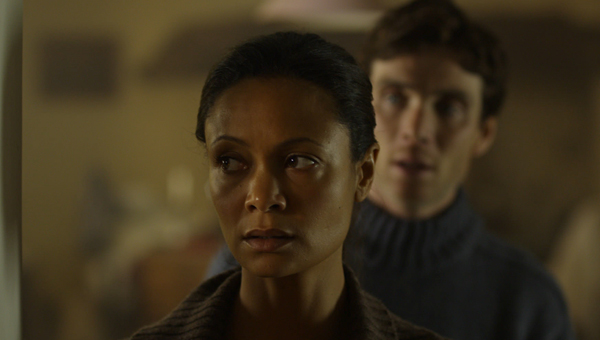Retreat Review

Two briefly intercut scenes in Retreat – Jamie Bell washes and dresses before a mirror; Cillian Murphy, on his hands and knees, weeps over a scattering of spilled nails – reveal the peculiar allure of film as a medium for concisely expressing complex ideas, and director Carl Tibbetts determination to exploit this brevity to maximum effect; packing his ninety minutes with as many hints and threats of conflict as he can muster.
In this quietly intimate thriller, Bell’s Private Jack Corman infects, overwhelms and undermines the fragile marriage of Martin (Murphy) and his wife, Kate (Thandie Newton), with menacing ease. The scenes mentioned come at the moment when Corman, allegedly an embittered soldier who’s AWOL from his regiment, has finally and completely insinuated himself into Martin and Kate’s relationship, ousting Martin as the masculine presence in this unsettled family dynamic.
We learn during the film’s tentative opening scenes that the married couple are visiting Blackholme Island, a remote Scottish outpost home to a beautiful, isolated cottage they’ve holidayed at before. The first clue to the couple’s discontent is heard rather than seen. As Martin attempts to secure a few homely charms, running over the landscape after catching a bucketful of fish like the Romantic hero of Friedrich painting, Kate remains hunched over her computer, trying to concentrate as she types a memoir recounting her recent miscarriage. Each motion of her husband clatters against Kate’s silence at irritating intervals, unnerving her clearly wounded, and justly sensitive, mind.
When the two do speak, there’s a muted inanity to the dialogue. Martin’s attempts to reconnect with his wife are definitively stunted when Kate reacts to his walking in on her in the bath as she might to a peeping tom.
Corman’s arrival energises proceedings dramatically. First spotted wandering zombie-like on the moors, unfortunately accompanied by a melodramatic swell of rushing strings that pulse in typical thriller style, but otherwise feel dissonant to Tibbets’ unsensational direction, Corman comes, wounded and with strange news. An airborne virus, originating in South America, is wreaking deadly havoc on the mainland. Whether this news is to be believed or not makes for one of Retreat’s more compelling tensions. The couple seem to have no choice other than to trust him. Fearing for their lives, they quickly acquiesce to Corman’s influence.
Like the rumoured virus, Corman infects the household and parasitizes its members, particularly Martin. With gradual determination, he appropriates the husband’s role, dressing in his clothes and tormenting Kate in a scene of grim seduction. Bell’s performance and Tibbets’ direction work in harmony here, particularly with the earlier mentioned intercutting. A shirtless Corman, reflected in the mirror and so appearing twice in the frame, contrasts starkly with Martin. The husband’s eyes are wet with tears as he is reduced to the menial pursuit of picking up screws for the physically stronger Corman, who will use them to nail up the boards that barricade the cottage’s entrances and keep out the infected.
Tibbets’ film is fascinated by what happens when all extraneous concerns are stripped back and people are left fighting solely for their own survival. For Corman, this situation leads him to become a kind of primitive in his element. He soon has Kate organising tinned food and the washing, and intimidates Martin, a man clearly unfamiliar with a hierarchy defined by physical prowess.
Although from time to time melodrama and incoherence threaten to overwhelm the drama, Retreat is a compact, dense film, and worth sticking with for its allusive final payoff. Its numerous ambiguities do leave a sense of dissatisfaction, but they are a cost worth paying, for they cause the film’s impression to linger long beyond the final scene. As the credits rolled, it was impossible not to replay the plot in memory.
Retreat’s great strength is that the restless doubt it explores doesn’t live only on the screen. By the film’s close, it is firmly instilled in the minds of its audience too.
James Munroe